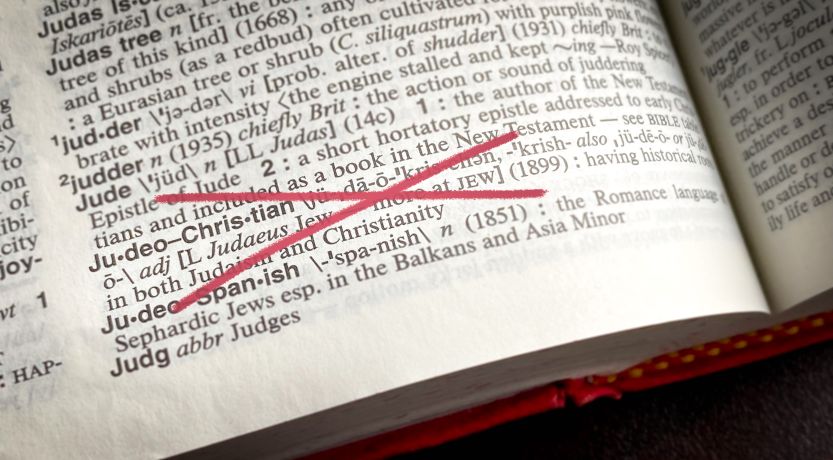Judeo-Christian Values Under Attack: What Can You Do About It?
Judeo-Christian values are falling out of favor, being replaced by humanistic secularism. What’s behind this, and how can you stand against it?

In Finland, Päivi Räsänen, a parliament member, is on trial, accused of making derogatory comments against homosexuals. One of the comments in question was a tweet containing a photo of Romans 1:24-27, which she used to express her opposition to LGBT ideology.
Her tweet was directed at the Evangelical Lutheran Church of Finland—one of the largest churches in Finland—for its support of a Pride march in 2019. She also wrote a booklet on the biblical view of gender and sexuality, entitled Male and Female He Created Them. The publisher of that booklet, Juhana Pohjola, is also on trial.
They are both accused of hate speech. The trial has morphed into a bigger debate on the role of the Bible in society.
Recent cultural shifts celebrating alternative sexual lifestyles have put those who believe in traditional Judeo-Christian morality at odds with national governments and even churches.
The consequence of secularism
The court case in Finland is a symptom of a greater issue in our nations. For some time now, some nations have become openly hostile to certain Judeo-Christian values—particularly pertaining to gender and sexuality. In some cases, those who express traditional views on morality are not just ridiculed or ignored—but actively prosecuted.
This is becoming true in the United States, where religion plays a more prominent role in public life than in other nations. But it seems those who espouse the Bible as their founding beliefs are becoming marginalized more and more.
Consider the following headlines:
-
The rise of secularism and moral relativism have caused societies to lose reverence for God’s Word and, in fact, to become openly hostile to it.
“Washington High School Coach Placed on Leave for Praying on Field.” - “Atlanta Fire Chief: I Was Fired Because of My Christian Faith.”
- “Marine Fired for ‘Bad Conduct’ After Refusing to Remove a Bible Verse From Over Her Desk.”
- “Christian Colleges That Oppose LGBT Rights Worried About Losing Funding.”
- “Baker Fined for Refusing to Make Transgender Transition Cake.” (Similar issues have been faced by web designers, florists and photographers.)
In the past, the Bible was held in high regard in the United States and other Western societies. But the rise and progression of secularism and moral relativism have caused these same societies to lose reverence for God’s Word and, in fact, to become openly hostile to it.
The Bible prophesied that this very thing would happen.
A famine of hearing God’s words
The Bible foretold a time when there would be a famine “of hearing the words of the LORD” (Amos 8:11). Amos did not prophesy that the Word of God would become unavailable, but that there would be a famine of “hearing” God’s words. That means people won’t be taught its laws and principles and won’t read with understanding. Despite the fact that God’s Word is accessible to virtually everyone today (through the printed word or electronically on websites and apps)—many people refuse to hear, read, understand or respond to it.
- Being complacent and trusting in one’s own wealth (Deuteronomy 8:18; Jeremiah 48:7; Revelation 3:17) or political leaders (Psalm 118:8-9; 146:3; Jeremiah 17:5).
- Considering the Bible as the equivalent of fictional fairy tales and scoffing at its words and promises (2 Peter 3:3-4).
- Neglecting to teach God’s Word to the next generation (Hosea 5:7).
- Ignoring spiritual knowledge while relying on physical knowledge, which is multiplying at an exponential rate (Hosea 4:6; Daniel 12:4; 2 Timothy 3:7).
The values that should provide the moral compass for our societies are being turned upside down and distorted, perhaps because of the beginning of the famine of hearing God’s Word. As such, our societies have twisted what is good to be evil, and rebranded what is evil as good.
Instead of using the Bible as the source of their values, they decide for themselves what is right, using human reasoning (Isaiah 5:20-21; Proverbs 14:12; 16:25). As this continues to get worse, those who follow biblical values will become “prey” to those who hate what the Bible teaches (Isaiah 59:15).
The rapid decline of mainstream Christianity
Many are also losing faith in popular Christianity. In the U.S. the number of “Nones”—those who profess no religious affiliation—has risen dramatically and continues to increase. From 1972 to 1990, the “Nones” grew from 5 percent to 8 percent. But, as of 2021, they account for 29 percent of the population!
We are witnessing a steady decline in faith among those who profess Christianity in the United States. This includes:
- A decline in church attendance. In the U.S., only one in four people is considered “practicing” (defined as attending church in the last month). Just over 20 years ago, 45 percent of Americans were considered “practicing” Christians.
- A decline in Bible reading and literacy. In 2021, only 11 percent said they read the Bible daily (down from 16 percent in 2019). Those who said they never read the Bible increased from 64 million in 2011 to 90 million in 2020.
Yet this trend is happening not just in America, but also around the world in the largest group that professes Christianity, the Roman Catholic Church.
Consider the following statements and actions from the spiritual leader of the Catholic Church, Pope Francis:
- In July 2013, when asked a question about homosexuality, he said: “Who am I to judge?”
- In September 2013, Pope Francis assured atheists that they don’t have to believe in God to be redeemed.
- In September 2017, Pope Francis signaled support for legal recognition of same-sex civil unions.
- In December 2021, Pope Francis said that extramarital sex sins are less serious than pride and hatred. (The biblical teaching, according to Romans 6:23, is that all sin results in death.)
The Catholic Church, under the leadership of the current pope, seems to be watering down more and more of the basic Judeo-Christian values.
Warnings of end-time false Christianity
In His Olivet Discourse, Jesus warned that a false Christianity would arise: “Take heed that no one deceives you. For many will come in My name, saying, ‘I [Jesus] am the Christ,’ and will deceive many” (Matthew 24:4-5).
The end-time world is characterized as a world that lives as if there were no laws given by our Creator.
Jesus also mentioned the rise of false prophets and false Christs, so much so that even the very elect of God may be deceived (verses 11, 24).
But how do they deceive?
One way they deceive is by claiming to come in Jesus’ name, professing that “Jesus is the Christ, the Savior,” but teaching doctrines that contradict what Jesus taught.
To study the doctrines of modern Christianity that contradict the Bible, read the articles in our “Christ Versus Christianity” series.
Jesus described the general state of the end times as “lawlessness” (verse 12), which literally means “without law.” The end-time world is characterized as a world that lives as if there were no laws given by our Creator.
How can you be different?
It is a universal truth that when people cast off God’s inspired revelation, they “cast off restraint” (Proverbs 29:18). In other words, they live however they want and do whatever they want. Our society is increasingly living without God’s law and casting off restraint.
Though our societies seem to be falling apart, all hope is not lost.
If you are not living that way now, then the first step is to learn what God expects and then repent and change.
This will make you different and require sacrifices, but ultimately the blessings that come will make it worth it. Proverbs 29:18 promises that “happy is he who keeps the law.”
To learn how God’s law can change your life for the better and help you avoid the lawlessness of society, download our free booklet God’s 10 Commandments: Still Relevant Today.
Date Posted: March 21, 2022



